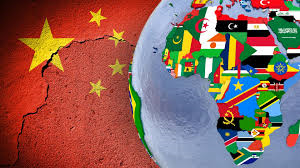Is china's push into Africa a sign of new colonization of it's resources and control of governments in power? By Hugo Keji

China’s push into Africa is frequently discussed in terms of whether it represents a form of neo-colonialism—a modern version of colonial exploitation focused on control of resources and influence over governments. While there are important differences between China's engagement in Africa and historical European colonization, certain elements of this relationship have raised concerns that China's influence could be exploitative or lead to a loss of sovereignty for African nations.
Here are the arguments on both sides of this debate:
Arguments That China’s Push into Africa Resembles Neo-Colonialism:
-
Control of Resources:
- China has aggressively pursued natural resources in Africa, such as oil, minerals, and agricultural products, to fuel its own economic growth. Chinese companies often secure favorable terms for resource extraction, leading critics to argue that China is exploiting Africa's resources much like colonial powers did in the past.
- Many fear that African nations are locked into unequal agreements that benefit Chinese companies and interests at the expense of local economies and communities. The long-term control of natural resources could limit African countries' ability to develop their own industries and economies.
-
Debt Dependency:
- China's Belt and Road Initiative (BRI) has led to massive loans for African infrastructure projects, often at terms that critics argue are unsustainable. If African nations are unable to repay these debts, they may be forced to hand over strategic assets, like ports or mines, to Chinese companies, as seen in other regions like Sri Lanka. This debt-trap diplomacy is seen by some as a tool for gaining political leverage and control over African economies.
- The concern is that African countries may lose their sovereignty as they become financially dependent on China, limiting their ability to pursue independent policies or align with other global powers.
-
Influence Over Governments:
- China’s "no-strings-attached" approach to aid and investment—unlike Western aid, which often includes conditions for human rights and governance reforms—can be appealing to African leaders, especially authoritarian regimes. This dynamic raises concerns that China is enabling or even encouraging autocratic rule by providing support without demanding democratic accountability.
- The growing presence of Chinese advisors, military trainers, and political leaders sharing the Chinese Communist Party's governance model with African leaders could influence governments to adopt more authoritarian styles of governance, concentrating power and reducing political opposition.
-
Economic Dependency and Exploitation:
- Many Chinese-funded projects rely heavily on Chinese labor and materials, limiting the benefits to local economies. Critics argue that this practice mirrors colonial systems where the colonizers reaped most of the economic rewards, leaving local populations with few opportunities for advancement.
- Additionally, African markets are increasingly flooded with cheap Chinese goods, which can undercut local industries and stifle local entrepreneurship, further deepening dependency.
Hospital Management Platform SaaS.. Hospital and Patients management system perfect for all medicals.
Partnership/Agent Needed. Earn As You Go on monthly basis.
Contact Admin: admin@healthdata101.com
+++++++++++++++++++++++++++++++++++++++++++++++++++++
Arguments Against the Neo-Colonialism Framing:
-
Mutually Beneficial Development:
- Chinese investments have contributed significantly to Africa’s development, particularly in infrastructure. Roads, railways, power plants, and ports built with Chinese financing have the potential to spur long-term economic growth, creating jobs and improving the quality of life for millions of Africans.
- Unlike colonial powers, which sought direct political control, China generally follows a non-interference policy, meaning it does not directly intervene in African countries' internal affairs or attempt to reshape their political systems.
-
African Agency and Partnership:
- African governments are active participants in their partnerships with China, and many see Beijing as offering a more attractive alternative to Western aid, which often comes with stringent political conditions. In this sense, African leaders view China as a partner rather than a colonizer.
- The relationship is framed as a South-South cooperation, with China and African nations working together as developing economies to achieve mutual growth. Unlike the colonial era, where African countries were subjugated by European powers, today's African governments have a say in negotiating deals with China.
-
Lack of Ideological or Territorial Ambitions:
- Unlike colonial powers, China is not attempting to impose its political ideology on Africa or occupy African territories. Its interests are primarily economic, focusing on trade, investment, and securing resources rather than exerting direct political control.
- China's focus on economic development contrasts with the imperialist ambitions of European colonizers, who sought to dominate and control African societies through political, military, and cultural means.
Conclusion:
While China’s engagement in Africa does not fit the traditional mold of colonization, its growing influence raises valid concerns about economic dependency, resource exploitation, and governance. Whether this amounts to a new form of colonization depends largely on how African countries manage these relationships and whether they can secure benefits that advance their long-term development without sacrificing sovereignty.
Critics see China's role as potentially exploitative, while supporters argue that it offers opportunities for Africa's development that are often not available through traditional Western channels. The key difference lies in how African leaders and citizens perceive the benefits and risks of this growing relationship, as well as whether they can maintain agency in shaping their own futures.
AfriPrime App link: FREE to download...
- Questions and Answers
- Opinion
- Motivational and Inspiring Story
- Technology
- Live and Let live
- Focus
- Geopolitics
- Military-Arms/Equipment
- Sicurezza
- Economy
- Beasts of Nations
- Machine Tools-The “Mother Industry”
- Art
- Causes
- Crafts
- Dance
- Drinks
- Film/Movie
- Fitness
- Food
- Giochi
- Gardening
- Health
- Home
- Literature
- Music
- Networking
- Altre informazioni
- Party
- Religion
- Shopping
- Sports
- Theater
- Health and Wellness
- News
- Culture

